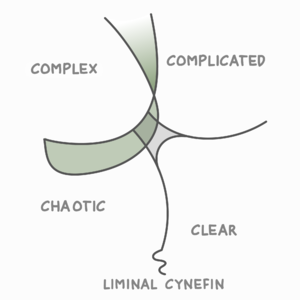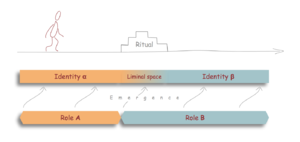Liminality
Liminality is...
| “ | Liminality may perhaps be regarded as the Nay to all positive structural assertions, but as in some sense the source of them all, and, more than that, as a realm of pure possibility whence novel configurations of ideas and relations may arise. | ” |
| — Victor Witter Turner, The Forest of Symbols: Aspects of Ndembu Ritual[1] | ||
Name and history
The word liminal comes from the Latin root limen, which means “threshold.” In anthropology, liminality is the quality of ambiguity or disorientation that occurs in the middle stage of a rite of passage, when participants no longer hold their pre-ritual status but have not yet begun the transition to the status they will hold when the rite is complete. (Wikipedia). What Turner described as betwixt and between.
It was introduced to Cynefin in 2017 and allows the suspending or holding a position related to the complex/compliance and complex/chaos transitions and avoids the necessity of introducing another domain, in effect, it adds two shadow domains while allowing the tapping of a wide body of literature.
"At once no longer classified and not yet classified" - lead to dual identity
A liminal space can be considered a space where risk-taking is balanced and therefore a safe space
- preliminal rites (or rites of separation)
- liminal rites (or transition rites)
- postliminal rites (or rites of incorporation)
Liminality in Cynefin
Boundaries/Transitions
(see these as safe spaces?) Complex/complicated and complex/chaos transitions are phase shifts
There are four liminal areas that need to be considered:
- Chaos/complex - this covers the original shallow dive into chaos from Cynefin dynamics and is a domain (again time?) that involves high levels of ambiguity and low levels of stability of hypotheses. Effective all constraints are abandoned to allow novelty to emerge but it is still contained.
- Complex/Complicated - this is a domain (time?) of pilots, prototypes or iterative experiments exploring all the viable or possible options before they are validated and migrated to the complicated domain
- Disorder - the authentic disorder sub-segment of the domain and really one addressed by the Aporetic turn
- Complicated - a small area/time when ideas still need to validated/endorsed by experts before being exploited. This is rare(?) and one that is normally entered from the Aporia state
Identity
The role of ritual is to allow identity to be changed - teacher to parent etc. This means that identity can be considered an emergent property of the role that you undertake in different contexts.
It also means that there is a potential for dual identity when we have not given up the previous/old one but have adopted the new/next one. This is the paradox of liminality that the old can infringe on the new or that we can be both.
Disorder and Aporia
Aporia (noun) -> aporetic (adjective
References
Articles
- Wikipedia definition - Liminality
Blog Posts
- Liminal Cynefin Revised
- Liminal Cynefin: the final cut?
- Dave Snowden on Liminality in Cynefin and Moving beyond Agile to Agility
Related concepts
Other references
- ↑ Victor Witter Turner. “The Forest of Symbols: Aspects of Ndembu Ritual”, p.97, 1967. Cornell University Press

